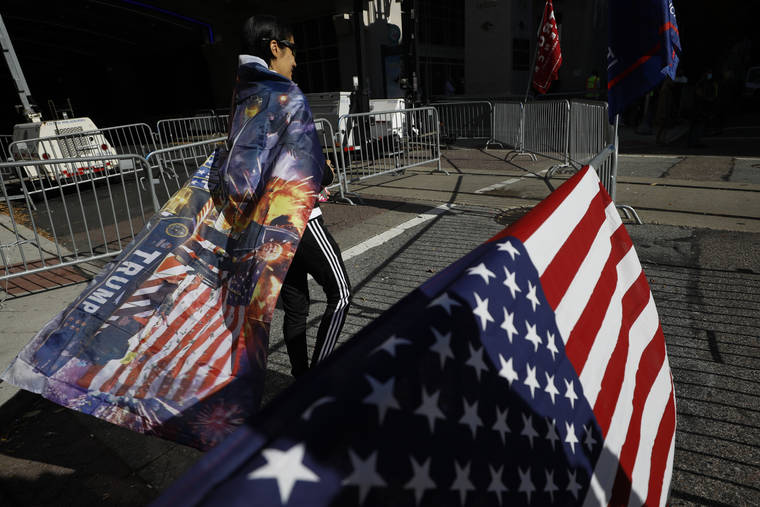Republican surrogates for President Donald Trump resumed their legal fight Monday to try to stop the vote count in key battleground states, including Pennsylvania and Michigan, but faced long odds given the Electoral College tally and recent court rulings that found no evidence of widespread vote fraud.
While some Republican officials invoked the Trump mantra that only “legal votes” should be counted, others emerged to counter the campaign narrative and urge voters, and perhaps the president, to support the results.
“The process has not failed our country in more than 200 years, and it is not going to fail our country this year,” said Republican Sen. Susan Collins of Maine, who won her reelection bid and has congratulated President-elect Joe Biden on his victory.
Still, Trump lawyers soldiered on six days after the election, just as personal counsel Rudy Giuliani had promised they would during a surreal weekend press conference outside a landscaping storefront in northeast Philadelphia.
Giuliani denounced the city’s vote count — which fell about 4-1 for Biden, giving the Democrat the win Saturday in both Pennsylvania and the U.S. election — as “extremely troubling.”
Across the country, Republicans have complained about problems with the signatures, secrecy envelopes and postal marks on mail-in ballots, the inability of their poll watchers to scrutinize them and the extensions granted for mail-in ballots to arrive. They filed another lawsuit Monday evening in federal court in Pennsylvania.
However, judges have largely rejected the Republican challenges over the past week, when the campaign sought to interrupt the vote count as it leaned toward Biden. Trump has yet to concede the election, even as the former vice president claimed victory and got to work on his transition plans.
At the U.S. Supreme Court, 10 Republican state attorneys general filed an amicus brief Monday to support a challenge to Pennsylvania’s decision to count mail-in ballots that arrived through Friday. The Pennsylvania Supreme Court had unanimously upheld the three-day extension set by Democratic state officials concerned about Postal Service delays and the COVID-19 pandemic. The attorneys general say the court usurped a power reserved for state lawmakers.
The U.S. Supreme Court had declined to fast-track the challenge, but the vote was 4-4, and three justices expressed reservations. Republicans now hope to try again with new Supreme Court Justice Amy Coney Barrett on the court. The attorneys general believe the extra time meant “unscrupulous actors could attempt to influence a close Presidential election.”
Still, it’s far from clear that enough ballots came in after Election Day to change the results of the presidential race in Pennsylvania.
White House Press Secretary Kayleigh McEnany, asked Monday for any tangible evidence of wrongdoing, said Republicans were trying to gather affidavits from witnesses.
“All we are asking for is truth, transparency and sunlight here,” McEnany said.
Earlier in the day, an anti-abortion law center in Michigan filed suit to complain about vote counting procedures in Wayne County. An appeals court in Michigan, meanwhile, asked the Trump campaign to refile a case submitted last week, saying the appeal was incomplete.
And in Arizona, the Trump campaign asked in a lawsuit filed Saturday for the right to inspect thousands of in-person ballots filled out on Election Day in the Phoenix area, alleging that poll workers had mishandled them.
In Georgia — where Biden has a small lead over Trump but the race remains too early to call — a state election official pledged Monday to investigate any ballot problems they find.
“When the margins are this tight, every little thing matters,” said Gabriel Sterling, who led the state’s implementation of a new voting system for the secretary of state’s office.
Still, he expressed frustration over efforts to shake the public’s faith in the electoral system.
“The facts are the facts, regardless of outcomes,” Sterling said.
——— Associated Press writers Kevin Freking in Washington, Patrick Whittle in Portland, Maine, Kate Brumback in Atlanta, Jacques Billeaud in Phoenix and Marc Levy in Harrisburg, Pennsylvania, contributed to this report.


